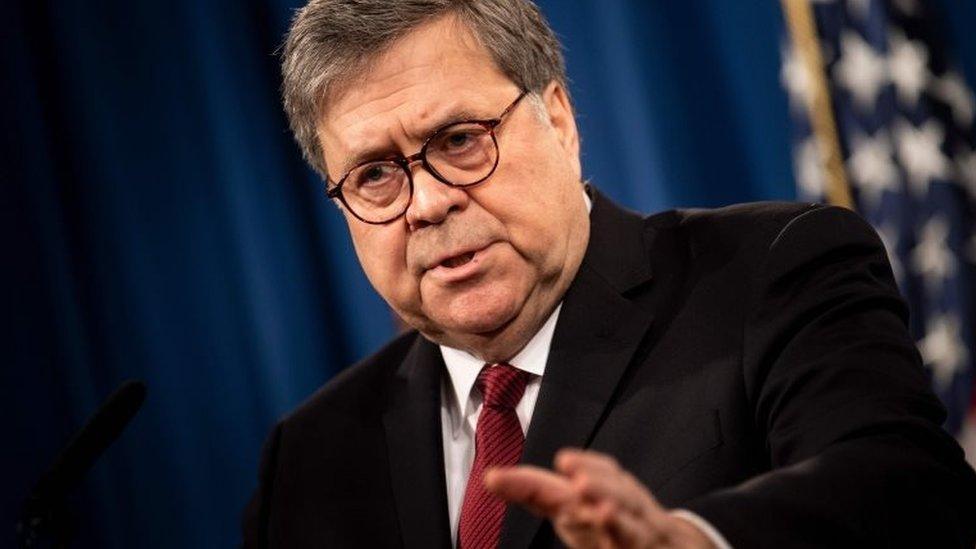Trump Russia investigation: Attorney General Barr backs Trump
- Published

William Barr has been criticised for holding a news conference before the report's release
The US Attorney General has defended President Trump over allegations of obstruction of justice, while reiterating that "no collusion" was found between his team and Russia.
William Barr held a news conference on Thursday, shortly before a long-awaited report into the matter was released, external.
He also revealed that investigators had examined 10 episodes of possible obstruction of justice by Mr Trump.
It comes as Mr Barr faces criticism over his impartiality.
Top Democrats have accused the country's top lawyer, who was appointed by Mr Trump, of media-managing the report's release by holding a news conference first.
A redacted version of the report by special counsel Robert Mueller was sent to Congress on Thursday morning and was then published online to the general public.
Mr Barr has said he was "committed to ensuring the greatest degree possible of transparency" with its release, and described redactions to the public report as "limited".
Minutes after Mr Barr's news conference ended, Mr Trump posted a meme saying it was "game over" for the "haters and the radical left democrats".
It followed a flurry of tweets he posted on Thursday morning in which he described the investigation as the "greatest political hoax of all time" and "presidential harassment".
What is the Mueller report?
The report contains the findings of a 22-month investigation into possible collusion between Russia and the Trump presidential campaign back in 2016.
Mueller report: One summary, two interpretations
It was led by Mr Mueller, who was chosen to run the investigation in 2017 following concerns from US intelligence agencies that Russia had tried to tip the election in Mr Trump's favour.
He also looked into whether Mr Trump obstructed justice when he asked for the inquiry into former national security adviser Michael Flynn to end, and later fired FBI chief James Comey.
Mr Flynn has since pleaded guilty to lying to the FBI about his contacts with Russia - one of six former Trump aides and 30 other people, including 12 Russians, charged in connection with the investigation.

A 'sympathetic' interpretation?
Analysis by BBC News North America Editor Jon Sopel
Here's a central question: where do you set the bar for how a president of the United States should behave?
This 45th holder of the post has delighted in breaking norms and conventions - some have claimed that his repeated assaults on the Mueller process amounted to interference and intimidation, but from the Attorney General, William Barr a much more sympathetic interpretation.
He says the President was frustrated and angered by a sincere belief that the investigation was undermining his presidency. But the Special Counsel Robert Mueller identified 10 occasions when the president may have obstructed justice - one of the high crimes and misdemeanours as set out by the US constitution that can lead to impeachment.
The Attorney General has ruled they do not pass a threshold where the president could face criminal prosecution. Mr Mueller though says something different: "While this report does not conclude that the President committed a crime, it does not exonerate him."
But is that OK? You can do what you like so long as it's not illegal? High minded folks will say that falls a long way short of the 17 'rules' that America's first president George Washington set out as civilised behaviour for a president.
At the end of this process it can be genuinely said that Donald Trump has changed the presidency; the presidency hasn't changed him.